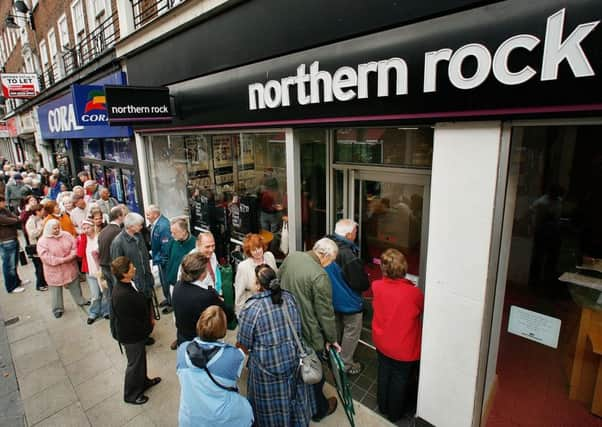Martin Flanagan: Northern Rock was just start of crash
This article contains affiliate links. We may earn a small commission on items purchased through this article, but that does not affect our editorial judgement.


Then a year later in September 2008 we saw the genuine article: the collapse of American investment banking giant Lehman Bros.
• READ MORE: Eight of Scotland’s most painful financial disasters
Advertisement
Hide AdAdvertisement
Hide AdThe proximate cause was sub-prime mortgage lending in the US, massively aggravated by the residential‑backed securities being bundled up into opaque packages of bonds and derivative contracts on banks’ balance sheets. Banks stopped lending to each other as they were scared of taking on the pass-the-bad-debt sub-prime timebomb. Bank share prices dived and policymakers and regulators were up against the clock.
Only taxpayer bailouts salvaged the whole western financial system, with Royal Bank of Scotland, Lloyds, UBS and Citigroup queuing up for state aid, and large bits of Northern Rock and Bradford & Bingley being nationalised.
The speed of the panic and value erosion in the sector was blowtorch. For example, the New York-based global investment bank Bear Stearns collapsed and was sold to JPMorgan Chase for a mere $236 million. A year earlier Bear Stearns had been worth $20 billion.
Unlike Withnail and I types who say if you can remember the 1960s you weren’t there, many in society do remember the crash and we were most definitely there.
The normally staid world of banking seemed to have gone mad. RBS chairman Sir Tom McKillop phoned Chancellor Alistair Darling in a panic, saying the bank was bleeding money. Darling asked him how long the bank could function, and McKillop said it would run out of money that afternoon.
It was in stark contrast to a year or so earlier when wholesale financial markets were freezing up just as RBS was persevering with its eventually disastrous £47bn consortium bid for Dutch bank ABN Amro. In rather un-bankerly language, then-RBS boss Fred Goodwin said his bank was “good for the money”. It had just a bit too much overtones of “I’ll see you and I’ll raise you.”
Advertisement
Hide AdAdvertisement
Hide AdThe nightmarish prospect of banks’ automated cashpoints not giving out money loomed, with the two other spectres of public panic and possible looting in view. Time has not lent the crisis softer hues.